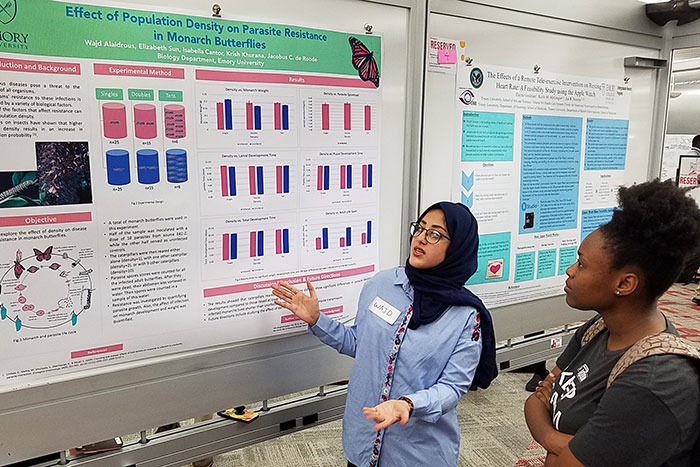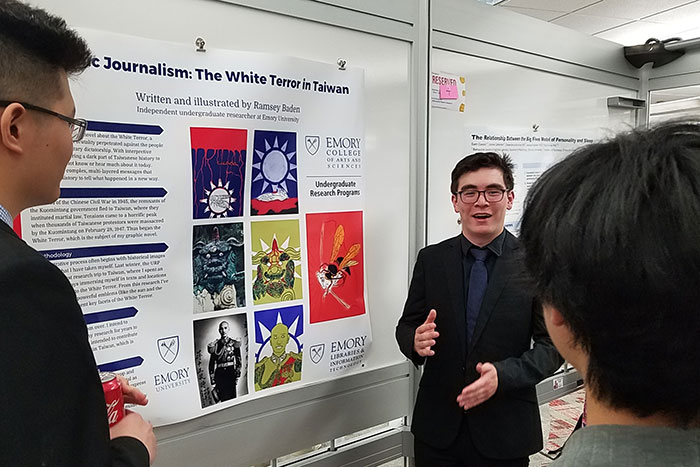More than 100 Emory students presented their research last week at the Spring 2019 Undergraduate Research Symposium, held for the first time in the Woodruff Library.
For three hours on April 24, Level 1 of the library was a beehive of activity as about 30 undergraduates simultaneously gave poster presentations each hour. Their research areas included biology, psychology, sociology, theater studies, linguistics and history.
Supporters, faculty and visitors moved among the presenters, listening to presentations and asking questions. Upstairs on Level 3 in the Jones Room, 10 students took their turns giving 15-minute oral presentations on their research projects.
In previous years, the symposium was held at the Math and Science building’s atrium, but the event has outgrown that space.
“This space in the library is perfect,” says Cora MacBeth, interim director and assistant dean of sciences of the Office of Undergraduate Education, which coordinates the Undergraduate Research Symposium. “In the past, due to the number of students, we had to split it over two days, which lessens the impact. But because we had enough space to accommodate everyone, it allows us to make it a more celebratory one-day event.”
The event, showcasing mostly students affiliated with Emory College, was part of Undergraduate Research Week, during which school and academic programs across the Emory campus hosted research symposia for their students to present their work.
Elayna Goodman, a sophomore in Emory College, presented her research on the feasibility of remotely monitoring the heart rates of senior citizens in an exercise program using Apple watches and an iPhone app. Her faculty mentors are assistant professors in the neurology department at Emory School of Medicine and work in research health science at the Atlanta Veterans Administration Hospital.
Goodman says she enjoyed giving her presentation.
“I think it’s a really good opportunity, especially because they reached out to the first- and second-year students,” Goodman says. “I’m also part of the Research Partners Program, and for the last two semesters we’ve gone to class once a week and learned how to write abstracts and present research in a professional manner and interact with mentors.”
Roger Deal, associate professor of biology, attends the symposium every year to support the students. “It’s a really important experience for their development,” he notes. “It helps to have them explain concepts and think about the things they take for granted mentally. It’s a good exercise in scientific communications. And it’s fun.”
It wasn’t all scientific research at the symposium. Ramsey Baden, a senior majoring in creative writing, presented his research on the White Terror, a period of history in which thousands of Taiwanese citizens suffered under an oppressive military dictatorship in the mid-20th century. Baden, who traveled to Taiwan on a Rose Library grant, intends to turn his research into a graphic novel.
“We see so little of the humanities represented in the research community,” says Baden, whose research touched on areas of history and art history, writing and visual arts. “It feels good to represent a different type of research that has very different methods that in so many ways are just as valuable. I think people may not realize you can get grants to do research in the humanities.”


